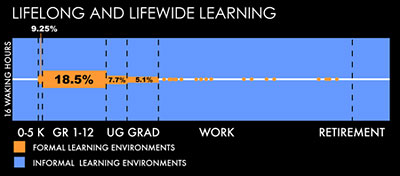Zoos, documentaries and hiking are vital to science literacy, finds new report
By Susan S. Lang

Informal activities such as visiting museums and zoos, hunting, going on nature walks, watching science documentaries, or participating in science clubs and after-school programs significantly contribute to scientific literacy, according to a new report from the National Research Council.
However, we still don't know whether digital media, video games, radio and news and entertainment programs do the same, said Bruce V. Lewenstein, Cornell professor of science communication, who co-chaired the committee that issued the report.
The report, funded by the National Science Foundation, was produced by a multidisciplinary committee of 14 experts in research and evaluation, exhibit design, program development and education. Members of the committee scoured through more than 1,200 articles, books and project evaluations to assess the evidence for whether and how informal science settings and everyday experiences contribute to people's knowledge of and interest in science.
"There was a lot of collective belief that these kinds of informal experiences are valuable, but the actual evidence was spread so far around in so many fields that it had never been brought together before," said Lewenstein. "Now we can say that evidence is abundant that these informal science environments and experiences play a critical role in triggering and sustaining long-term interests and sophisticated learning in science."
The report says that learners in informal environments experience "excitement, interest and motivation to learn abut phenomena in the natural and physical world." While these responses are important for any learning, they form the foundation for learning in informal environments rich in science phenomena, Lewenstein explained.
Such environments are also important because they help members of the public "form an identity to think of themselves as someone who can be interested in, asks questions about and maybe even contribute to science," said Lewenstein.
The work of the committee documented that informal science environments and experiences contribute significantly to overall lifetime learning, said Lewenstein. "Over the life span, the percent of time we spend in formal schooling is very small compared with the rest of our lives." And that time spent outside of school is rich in informal situations and natural settings from which many of us do, indeed, learn about science, he added.
The report also offers recommendations for those who interact with the public on ways to promote science learning. A separate volume, targeted more directly at outreach practitioners, will be issued later this year, Lewenstein said.
The full report is available on the U.S. National Academies of Science Web site.
Media Contact
Get Cornell news delivered right to your inbox.
Subscribe